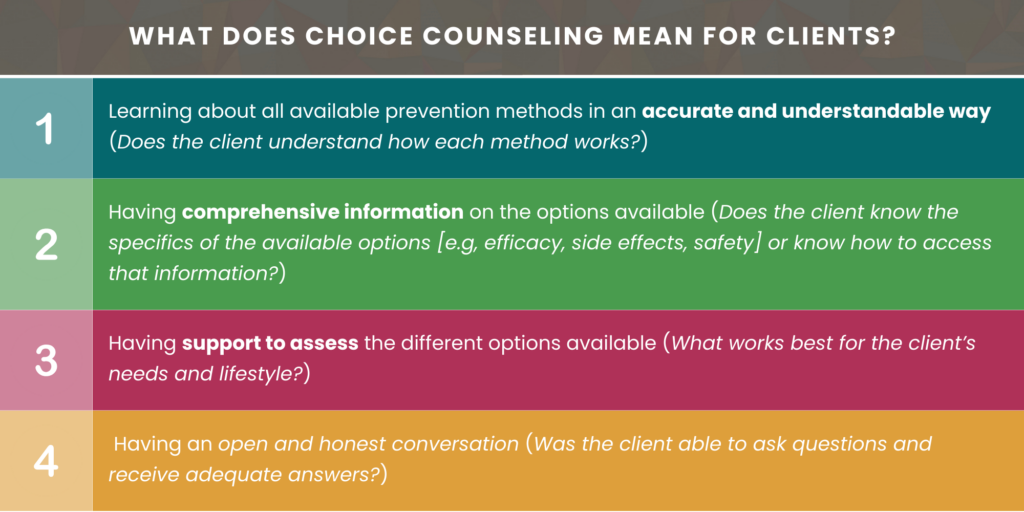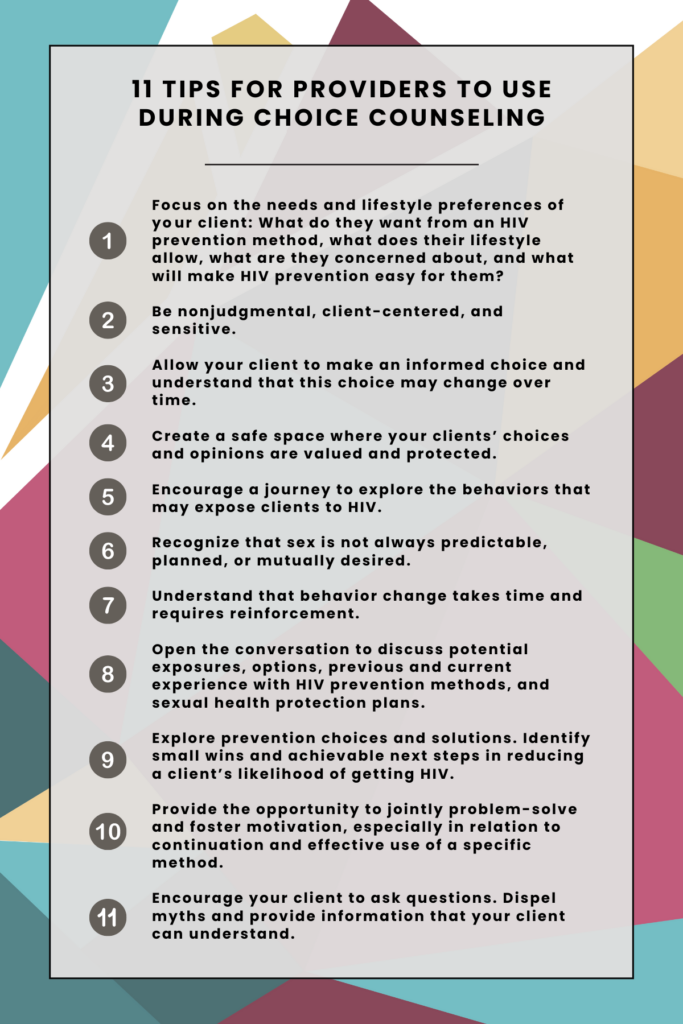Allison Cole, FHI 360
Elmari Briedenhann, Wits RHI
Emily Donaldson, FHI 360
As the HIV prevention field continues to grow and introduce new HIV prevention methods such as the PrEP ring and CAB PrEP, individuals have more options to choose from. But having options alone does not equal having choice.
To benefit from the availability of multiple PrEP options, PrEP users need to be able to make an informed choice. According to the MOSAIC Choice Principles, informed choice is when an individual has the autonomy, knowledge, and freedom from coercion at any given time to select the best method for them in a specific market. To make an informed choice, an individual needs to know what options are available and have access to relevant, accurate, and understandable information about those options. The individual can then weigh the benefits and suitability of each option according to their own needs and circumstances. Choice counseling is critical to enabling informed choice for HIV prevention.

LESSONS FROM FAMILY PLANNING
The family planning field has taught us a lot about choice counseling through experiences with contraceptive counseling. Ali and Tran define contraceptive counseling as the exchange of information on contraceptive methods based on an assessment of a client’s needs, preferences, and lifestyle to support the client’s own decision-making:
“This includes the selection, discontinuation or switching of a contraceptive method. The key principles are based on coercion-free and informed choice; neutral, understandable and evidence-based information; collaborative and confidential decision-making process; ensuring respectful care, dignity, and choice.”
Family planning research has shown that when the focus is on client needs and lifestyle, consistent use of contraception increases. One study found that high-quality interpersonal counseling can sustain their continued use of contraception six months later.
CHOICE COUNSELING IS A CONVERSATION
Choice counseling for HIV prevention is a conversation between client and provider, centered around the needs and lifestyle of the client. The provider should explore a client’s knowledge of available prevention methods by engaging the client on what is important to them, asking questions such as “What do you want most from your method… do you need discretion, something that only you know about and control, or something that will prevent HIV infection no matter the type of exposure?” Discussing a client’s needs and what could potentially fit into their unique life circumstances allows the provider to fill any knowledge gaps about methods and advise the client on what is available and realistic.
This kind of conversation helps clients feel comfortable with a provider so that they can openly share their needs and preferences. To ensure that a counseling conversation leads to the best method for a client at that time, the client needs to be honest with themselves and their provider. This kind of honesty (which may be difficult) can be encouraged through respectful, nonjudgmental choice counseling.
Choice counseling is not a one-time conversation. Providers should check in with clients at each follow-up visit to make sure the method the client is using still fits their lifestyle. It is okay for a client to change their mind! Clients have the right to decide at any time that a method no longer meets their needs. The world is constantly changing, and so are people. What worked yesterday for someone may not work today.
Health care providers are ultimately the choice counseling heroes of PrEP and HIV prevention choice. When they are trained and supported on an ongoing basis—on informed choice, choice counseling principles, and the various tools to support choice counseling—what seems like a massive task becomes second nature. Practical training exercises, such as role-play or simulated client engagement, are incredibly useful in building provider confidence for effective choice counseling.

Featured Image: The PrEP methods section of the HIV Prevention Ambassador Training Package and Toolkit (iTAP Media/MOSAIC).


